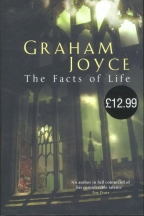The Facts of Life
Graham Joyce
Orion / Victor Gollancz
UK Hardcover First
ISBN 0-575-07230-X
Publication Date: 12-05-2002
288 Pages; £12.99
Date Reviewed: 04-04-03
Reviewed by Rick Kleffel © 2003

REFERENCES
COLUMNS
|
|
|
The Facts of LifeGraham JoyceOrion / Victor GollanczUK Hardcover FirstISBN 0-575-07230-XPublication Date: 12-05-2002288 Pages; £12.99Date Reviewed: 04-04-03Reviewed by Rick Kleffel © 2003 |
|
|
REFERENCES |
COLUMNS |
The best fiction is at its most basic just about life; human life in a family, in a city, in a country, in a time of peace, or of war. Too often, however, books about life trend towards the soap operatic, and by detailing the events of life they somehow manage to exclude life itself. Books about the supernatural, which should be ultimately about life, tend to be more about violence, death and lots of stuff most people will never see in their lives; thus they too exclude life from between their covers. Worse, by shoving the reader's face in some contrived bit of supernatural experience, they diminish the effectiveness of the literary device -- the supernatural -- they are trying to leverage.
In 'The Facts of Life', Graham Joyce offers readers a rough and ready portrait of life itself, gritty, funny, sometimes scary, sometimes weird, and sometimes just plain inexplicable. This is a book stuffed to the rafters with characters who grab the reader as easily as they grab one another. It's filled with the life of the city of Coventry during and after the blitz, told as it follows the life of a baby born out of the blitz.
The Vine family is a huge powerful matriarchy. Mother Martha leads seven sisters; Aida, Beatie, Cassie, Evelyn, Ina, Olive and Una, and their spouses and offspring through the war and beyond. Martha is powerful and not just because she's stubborn. She's prone to some supernatural intrusions, and some of her daughters are as well, particularly the "fey" Cassie. As the novel begins, Cassie's son Frank has been born without a father. She waits on the steps of the Church to give him away to a good home, but a vision intercedes and she decides to keep him. Once this has been confirmed, Martha comes up with a plan to raise Frank by having Franks (and sometimes Cassie) passed between the other daughters' homes. Cassie goes through 'blue periods' when she disappears, sometimes for days at a time, compromising her ability to be a mother. Martha's plan is a great way for readers to become intimately familiar with the fascinating Vine family.
Joyce covers an incredible amount of time and characters in a very short book that reads quickly and easily and yet seems to contain more material than books three times as long that take six times as long to read. It's alternately laugh-out-loud funny, touching, loving, hilarious, frightening, gripping and yet wonderfully light. Joyce's prose is lovely, a sort of rough-cut here-and-now slice of life that gets to heart of the matter without dithering about. Beyond the sisters, there are twice as many more characters, each of who comes fully to life in the kind of confident writing that bowls readers over without their knowledge. Here's a book that will bring the reader a varied emotional rush that is incomparably powerful.
Joyce does shade in a few touches of the supernatural, but they're not the point of the book and they're not the highlight of the book. They will however thrill readers of supernatural literature with their clearly imagined veracity and their originality. Joyce points readers towards a set piece near the center of the novel set during an intense bombing raid that practically decimates Coventry. However, the power of his book is such that his showpiece simply slots in alongside all the other events that are so well portrayed. A family dinner in Joyce's novel is apt to cleave as deeply as repeated bombing by the Germans.
'The Facts of Life' is another step towards the mainstream by this talented writer, and it's easily his best novel yet. Rather than compromising as he writes stories more accessible to more readers, Joyce has managed to simply find the resonant power in the simplest gestures. This is the kind of book that one expects to find nominated for the Booker Prize, but it's probably more enjoyable than the average prizewinning novel. From an experiment in communal living to a spiritualist church, Joyce revels in the wild variety that grew in post-war Britain. Though the life during wartime that Joyce depicts is anything but sunny, the light that he infuses into the souls of his characters is nothing less than the light of life.